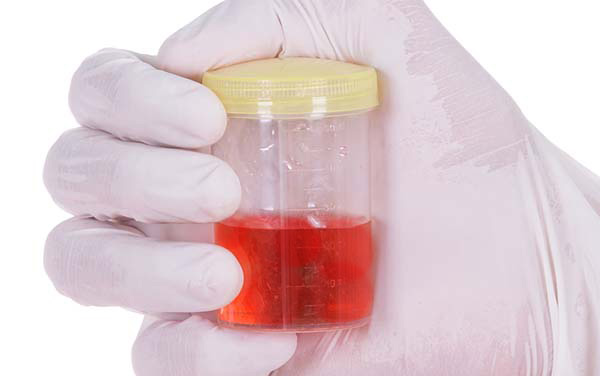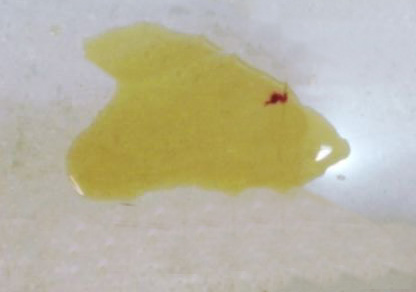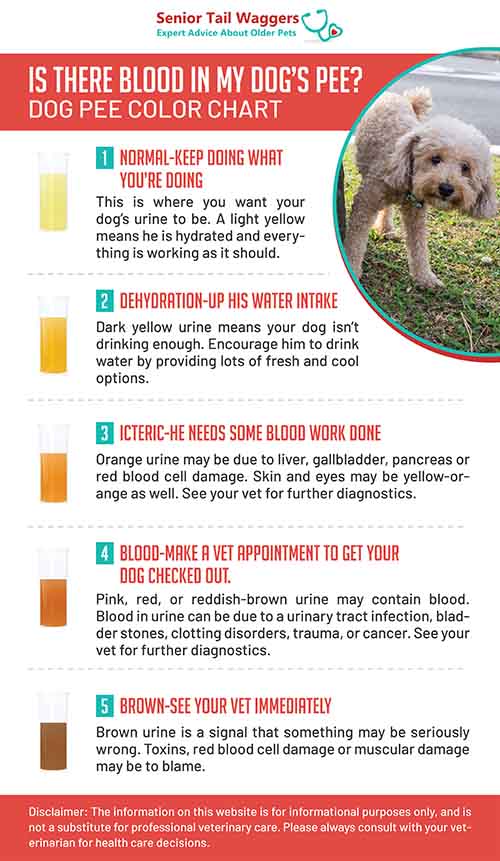
This article was updated on August 26th, 2023
Blood can take many forms in a dog’s urine and it can sometimes be hard to tell that there’s blood for sure. With this in mind, let’s take a look at some ways that blood may show up in your dog’s pee and what each type may mean.
Red or Pink Urine
This is going to be the most obvious sign of blood in your dog’s pee. The red color comes from either intact red blood cells or the pigment that’s left over after red blood cells are broken down. Red or pink urine is most commonly found with urinary tract infections, urinary stones, prostate problems in intact males, tumors, or trauma.

Small Blood Clots in Dog Urine
When there’s blood clots in your dog’s urine, it’s usually a sign that something more severe is going on. The urine containing the clot may be normal colored or it may be tinged red or pink. Blood clots in dog pee may come from severe infections, trauma, kidney or bladder stones, different types of cancer and issues affecting the thyroid, hormones, and digestive system.

Orange Dog Urine
Orange dog pee isn’t technically blood itself, but rather due to the byproducts of the breakdown of red blood cells. Orange dog urine may at first look like blood and is still a cause for concern as the liver or pancreas could be involved. Orange dog pee may also be due to an abnormal breakdown of red blood cells.

Normal Dog Urine
To further confuse things, your dog may have blood in their urine without any noticeable color changes. This is called microscopic hematuria since the blood isn’t visible to the naked eye. Dogs with microscopic hematuria may still have signs, such as dribbling pee, accidents in the house, or straining to pee or have no signs at all. This type of blood can be found on microscopic examination or on a urine dipstick.
Dog Pee Color Chart – Is There Blood in My Dog’s Pee?

No matter what type of blood you find in your dog’s pee, it always warrants a veterinary visit as some causes can be very serious and require immediate treatment.
What to Do If You Find Blood In your Dog’s Pee
Read our veterinarian recommendations for what to do if you find blood in your dog’s pee.
Related posts about blood in dog’s urine:
 My Dog is Peeing Blood! 2 Vets Explain What to Do - The sight of blood in your dog’s urine can be extremely scary and make any pet owner feel concerned. But… [...]
My Dog is Peeing Blood! 2 Vets Explain What to Do - The sight of blood in your dog’s urine can be extremely scary and make any pet owner feel concerned. But… [...] Blood Clots in Dog Urine [Pictures + Veterinarian Advice] - As a dog parent, you keep a close eye on what your dog eliminates. Even though it may sound gross,… [...]
Blood Clots in Dog Urine [Pictures + Veterinarian Advice] - As a dog parent, you keep a close eye on what your dog eliminates. Even though it may sound gross,… [...] Female Dog Peeing Blood But Otherwise Acting Normal: Is It Serious? - We do it every day - we take our dogs out to the grass, wait for them to potty, and… [...]
Female Dog Peeing Blood But Otherwise Acting Normal: Is It Serious? - We do it every day - we take our dogs out to the grass, wait for them to potty, and… [...] Male Dog Peeing Blood but Acting Normal: 4 Common Causes - Seeing your male dog peeing blood is a scary sight, even if he is acting normal. But it may ease… [...]
Male Dog Peeing Blood but Acting Normal: 4 Common Causes - Seeing your male dog peeing blood is a scary sight, even if he is acting normal. But it may ease… [...] My Senior Dog is Peeing Blood – A Vet Explains What to Do - Anytime a pet owner sees blood in their dog’s urine it is a cause for concern. In my practice, I… [...]
My Senior Dog is Peeing Blood – A Vet Explains What to Do - Anytime a pet owner sees blood in their dog’s urine it is a cause for concern. In my practice, I… [...] My Dog is Peeing Blood But Otherwise Acting Normal - Every morning, you take Fido out for a pee on the grass. But today, something weird happened. After relieving himself,… [...]
My Dog is Peeing Blood But Otherwise Acting Normal - Every morning, you take Fido out for a pee on the grass. But today, something weird happened. After relieving himself,… [...]Related posts about dog peeing issues:
Disclaimer: This website's content is not a substitute for veterinary care. Always consult with your veterinarian for healthcare decisions. Read More.







Be the first to comment